“To be yourself in a world that is constantly trying to make you something else is the greatest accomplishment.” This powerful quote by Ralph Waldo Emerson encapsulates the essence of the struggle faced by the LGBTQIA+ community. Pride is about embracing one’s identity without shame. It’s a celebration of being true to oneself and standing tall against societal pressures. However, this support shouldn’t be limited to just one month—true allies stand with the LGBTQIA+ community all year round, championing their rights and promoting inclusivity every day.
You don’t have to be gay to understand the challenges the LGBTQAI+ community faces. Many incredible people you know, and many more you have yet to meet, are part of this community. Supporting them is about empathy and humanity, transcending personal experiences. Whether it’s poverty, racial injustice, or LGBTQAI+ rights, standing up for others is a collective responsibility.
That’s why I am where I am – at BrightMarbles Group. This is the biggest reason why the small battles I fight make sense – I am surrounded by people who share the same goals and dreams; the dream to work, to create solutions that drive the world, but also the most beautiful: To help the community by leveraging all the strength we can accumulate together. If nothing else, to be advocates, allies, and to be recognized as those who may not have walked a mile in someone else’s shoes but are more than willing to walk more than a mile—we’ve already taken some steps.
BrightMarbles Group has brought together a large number of enthusiasts and highly skilled individuals with big hearts, ready to step beyond rainbow-colored logos during Pride Month. Through various workshops and initiatives, we have shown where we see ourselves in the future—we are educators who generously share knowledge combined with incredible courage. We go beyond boundaries, reaching out to the margins where we find our fellow citizens, friends, neighbors, and all the wonderful people who need our attention and help.
And we start from our own home. We have initiated a collaboration with a local organization that gathers LGBTQAI+ individuals, based on the essence and the beginning and end of every process towards a better society—education. We want to learn where we can improve, and once we know that we will be better for others. Then, we will easily share that knowledge. It’s simple.
It’s Pride Month, But What Do They Have to Be Proud Of?
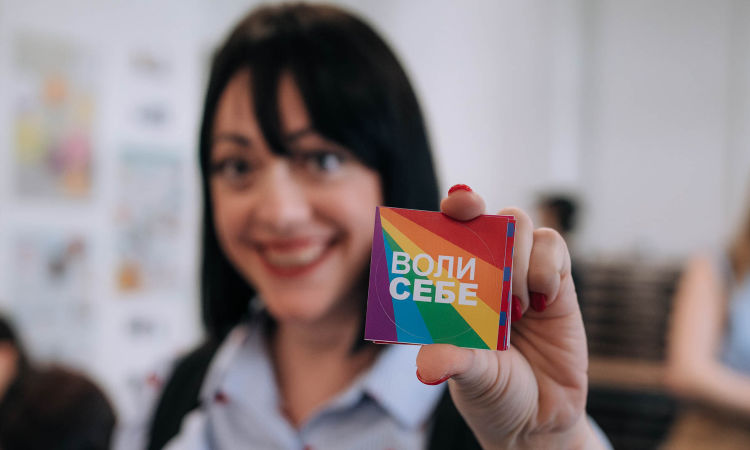
In the context of the fight for LGBTQAI+ rights, Pride signifies the sense of self-acceptance and dignity within a community that has faced long-standing discrimination and stigma. The term emphasizes the importance of being proud of one’s identity and resisting shame and marginalization. It’s important that we have an answer as long as they keep asking the same question, right?
The roots of Pride trace back to the Stonewall Uprising in 1969, a pivotal event in the LGBTQAI+ rights movement when community members stood up against police brutality and discrimination. This act of resistance became a symbol of empowerment and pride.
Pride represents not only a celebration but also a continuous struggle for equality, acceptance, and human rights. As Harvey Milk said, “It takes no compromise to give people their rights. It takes no money to respect the individual. It takes no political deal to give people freedom.”
Pride Month, celebrated every June, is an opportunity to raise awareness about the importance of inclusion and diversity and to support the LGBTQAI+ community in their quest for equality. However, many individuals, companies, and movements seem to wait until the end of June to paint the walls gray again. Why? Perhaps it’s because walls (and business suits) are naturally gray, right?
70% Hushed, 100% Pride Missing
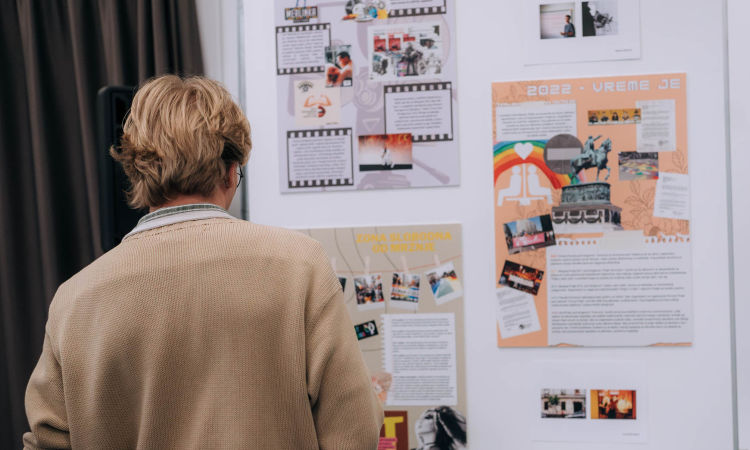
Numbers seem to never be friends. In 71 countries, homosexuality is criminalized, and in 11 of those, the death penalty is possible. Hate crimes and discrimination are rampant, especially in Eastern Europe and the Balkans, where 70% of LGBTQAI+ individuals rarely come out. The situation is as expected—grim and challenging.
However, the sun seems to shine a bit brighter in places like Canada and Western Europe. In these regions, acceptance rates soar, with over 80% support for LGBTQAI+ rights. Australia also stands out with its high levels of acceptance and support.
South Africa and India have made significant strides forward, showing that progress is possible even in places with deeply rooted prejudices. Yet, despite these improvements, challenges persist. It’s a reminder that while some regions are moving forward, others still have a long way to go in ensuring equality and safety for all.
Coming out is tough globally. Spain shows more acceptance, while Singapore and Japan have higher negative reactions. Normalizing non-heterosexual orientations remains a long journey. In the US, 5.6% of adults identify as LGBTQAI+, in the UK, the number of people identifying as LGBTQAI+ increased by 50% from 2014 to 2024.
And What Problems Do They Even Have?
Due to societal stigma and discrimination, LGBTQAI+ individuals are at a greater risk for mental health issues. They often struggle with anxiety, depression, and suicidal thoughts more than their heterosexual peers. This constant battle with mental health highlights the urgent need for better support and understanding.
Furthermore, many LGBTQAI+ individuals face unfair treatment at work. In the US, 46% of LGBTQAI+ workers report discrimination, including being passed over for promotions, paid less, or harassed. Inclusive workplace policies are crucial to creating environments where everyone feels valued and respected.
Unfortunately, violence against LGBTQAI+ people, especially transgender individuals, is alarmingly high. In 2020 alone, at least 350 transgender and gender-diverse people were murdered globally. Legal protections vary widely across the world, affecting the safety and quality of life for LGBTQAI+ individuals. While some countries have progressive laws supporting same-sex marriage and anti-discrimination policies, others still criminalize same-sex relationships.
Despite these challenges, societal attitudes towards LGBTQAI+ individuals are improving. Acceptance is growing, particularly among younger generations. In the US, about 9% of millennials identify as LGBTQAI+, compared to 3.8% of those born between 1965 and 1980. Support for same-sex marriage has also increased significantly, with 67% of Americans in favor, up from 37% in 2009. More workplaces are adopting inclusive policies, with 91% of Fortune 500 companies including sexual orientation in their non-discrimination policies, and 83% including gender identity.
This progress shows that while there is still a long way to go, there is hope for a more inclusive and accepting future.
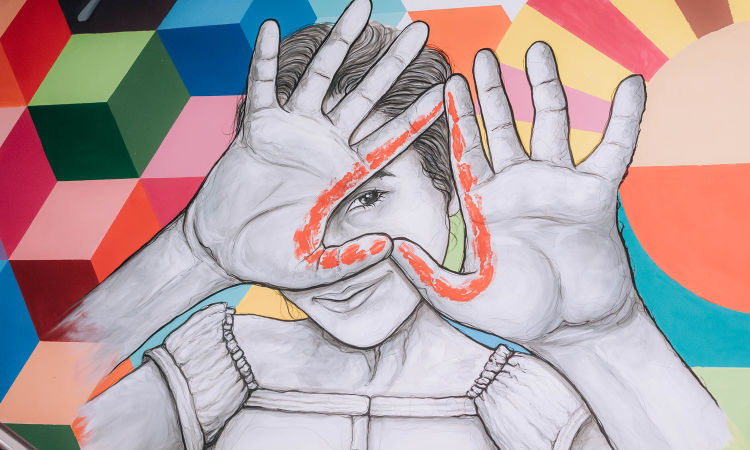
Serbia: Land of Beautiful Nature, Great Food, and Life Between Four Walls
LGBTQAI+ rights in Serbia have come a long way over the past two decades, but there are still plenty of hurdles to overcome. Sure, same-sex activities are legal, and there are anti-discrimination laws in place for things like employment and education. But there are still major gaps. The Serbian Constitution defines marriage strictly as a union between a man and a woman, leaving same-sex couples without any legal protections.
Milestones? Oh, there have been a few. The Anti-Discrimination Law of 2009 and the allowance for transgender individuals to change their legal gender without surgery are big steps forward. The first Pride Parade in Belgrade in 2010 was a major moment for visibility and acceptance of the LGBTQAI+ community.
Despite these legal protections, public opinion remains largely negative. Many people still see homosexuality as an illness. Violence and discrimination are common, and Pride Parades often need heavy police protection or even get canceled due to safety concerns. Recently, conservative groups have pushed for the removal of references to gender and sexual identity from school textbooks, which is a big setback for LGBTQAI+ education and awareness.
Serbia’s cultural and historical background adds to the challenges. Traditional values and the strong influence of the Serbian Orthodox Church often oppose LGBTQAI+ rights. Right-wing political groups and nationalist organizations also create a hostile environment. The relationship between the government and civil society organizations, including LGBTQAI+ activist groups, is often strained, making significant progress difficult.
Support from the business sector can make a huge difference. Companies that actively support LGBTQAI+ rights can help create a more inclusive environment. This can be done by implementing inclusive policies, providing benefits that meet the needs of LGBTQAI+ employees, and organizing training and workshops to reduce prejudice and foster understanding. Consistent and visible support through partnerships with LGBTQAI+ organizations and continuous initiatives—not just during Pride Month—shows long-term commitment. That’s why it’s important to speak out loudly, if not as an individual, then as a company.
Serbian Companies with Year-Round Rainbow Walls
In Serbia, publicly supporting the LGBTQAI+ community as a company is not easy. The country still grapples with conservative views where such support is often seen as unconventional. However, for example, companies like Nordeus, EY Serbia, Coca-Cola HBC Serbia, PwC Serbia, and Microsoft Serbia are breaking these barriers and doing fantastic work for their employees and the broader community.
These companies, and many others, organize various events, workshops, and training sessions to raise awareness about LGBTQAI+ issues. They implement inclusive policies, such as anti-discrimination measures and support for transgender employees, creating a welcoming environment for all. Regular educational programs help foster understanding and empathy among employees. Additionally, these companies sponsor LGBTQAI+ rights events and initiatives, demonstrating their commitment to equality and inclusion.
These efforts not only improve the work environment but also contribute significantly to societal acceptance and support for LGBTQAI+ rights. By fostering a culture of inclusion and actively supporting the LGBTQAI+ community, these companies set an example for others to follow, building a fairer and more equal society for everyone. A good example is a good example, even in the Balkans.
Why Is It Important to Think Outside of June?
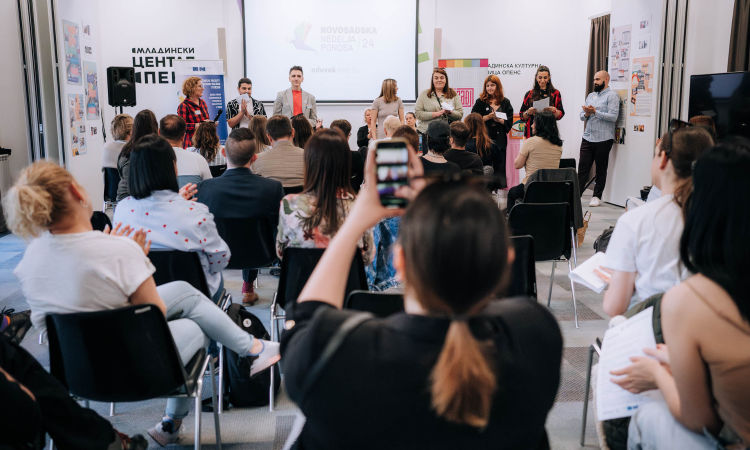
Human rights must not be like New Year’s decorations that we take down in mid-January and pack away in a box alongside our enthusiasm, hope, and well wishes. The fight for human rights must transcend the boundaries of changing a company’s logo during June. Why?
Is Our Community Strong Because We Stick Together?
Continuous support makes the community stronger. It’s important to provide ongoing support both internally, from an employee’s perspective, and externally, affecting the brand and the community. Therefore, at BrughtMarbles Group, we strive to speak up, celebrate, remind, and advocate whenever we can. Creating an inclusive workplace where everyone feels accepted and valued is our ultimate goal. But it’s also important for us to constantly work on learning, all together.
Environment – That’s Us!
At BrightMarbles Group, we understand that our policies, culture, and energy create the environment where our team members thrive. This environment shapes how individuals feel and how much they contribute, both to our company and to society. Recognizing that diversity is key to creativity and innovation, we are committed to fostering an atmosphere where authenticity, inclusion, and freedom flourish.
Our goal isn’t just to produce great work; it’s to ensure that every person who walks through our doors leaves satisfied, ready to positively impact their day and their community. When our team members are true to themselves, they bring their best to the table, making our team stronger and more cohesive. Does that sound like empty talk? It’s not because we make it a part of our daily efforts, every single day throughout the entire year.
Leaders Must Be Doing Something Right, Right?
IBM set a standard for long-term support for the LGBTQAI+ community in 1984 by introducing policies against discrimination based on sexual orientation. Their commitment included healthcare benefits for same-sex partners and support for transgender employees during their transition. By raising awareness and educating all employees, IBM created a welcoming and respectful work environment, fostering innovation, employee satisfaction, and business performance.
Salesforce is another leader in supporting LGBTQAI+ rights, significantly boosting employee morale and engagement. Known for its commitment to inclusion and diversity, Salesforce actively supports the LGBTQAI+ community through public statements and actions. The company’s resource groups for LGBTQAI+ employees organize events, education, and support networks.
Nike’s “Be True” campaign is a shining example of how ongoing support for the LGBTQAI+ community can positively shape a brand’s image. This campaign actively backs LGBTQAI+ athletes and the community year-round, with special collections designed by LGBTQAI+ artists and activists. A portion of the proceeds supports LGBTQAI+ organizations, funding important projects and promoting inclusion. Nike’s support extends to sponsoring LGBTQAI+ events and sharing the inspiring stories of LGBTQAI+ athletes, enhancing their image as a progressive and inclusive brand.
Loyalty – An Obvious Choice or the X Factor?
Companies that consistently support the LGBTQAI+ community build a reputation as socially responsible and progressive. This genuine commitment attracts not only LGBTQAI+ customers but also a broader audience that values inclusion and equality. It’s not about marketing gimmicks; it’s about making the world a fairer, more compassionate place. Consumers increasingly seek ethical companies, and steadfast advocacy for LGBTQAI+ rights strengthens brand loyalty and attracts talented professionals.
Key Actions You Can Take in January, March, November, and Beyond
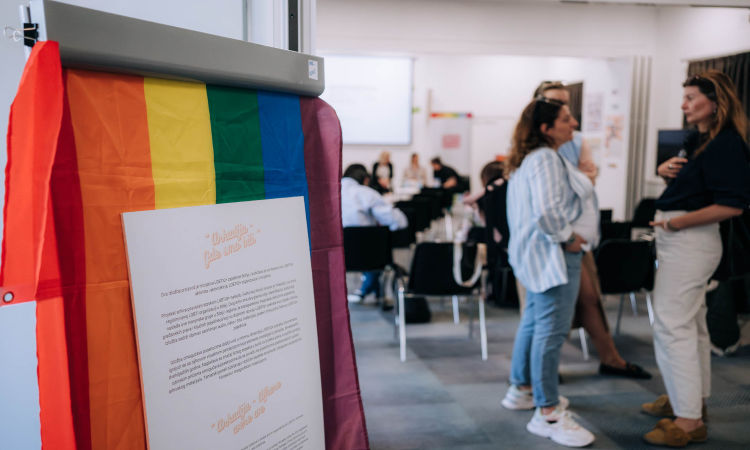
Creating a supportive workplace for the LGBTQAI+ community goes beyond moral duty—it’s crucial. Clear anti-discrimination policies ensure everyone feels safe and respected.
Regular training and workshops on sexual orientation, gender identity, and the unique challenges faced by LGBTQAI+ individuals foster understanding and empathy. Adjusting workspaces for transgender employees, like adding gender-neutral restrooms and covering transition-related healthcare costs, makes a huge difference. Consistent support throughout the year, through partnerships with LGBTQAI+ organizations, regular donations, and promoting equality, shows a genuine commitment. Long-term support builds a strong, positive brand and a better workplace. Hosting LGBTQAI+ events, creating mentorship programs, and updating policies to meet the community’s needs fosters a culture of inclusivity and acceptance.
By truly committing to these actions, businesses can make a real difference every day.
At the End of the Day… Is It the End of June?
Pride should extend beyond 30 days of rainbow-colored logos. True support requires ongoing commitment, empowering individuals and society. It means creating inclusive environments where everyone feels valued and accepted. By committing to long-term support and fostering true inclusivity, we build a fairer, more equal world.
The possibilities for support are vast, and there’s always time to find. The question is whether we even want to do it, and if not, what exactly is holding us back? At the end of the day, just as at its beginning, we stand in front of the mirror. We wash our faces, brush our teeth, and towel off. This is the perfect moment to ask ourselves: Do we want to see shame or pride?
About Author
Svetlana Kosić is a marketing specialist who holds a master’s degree in media design in education. With extensive experience in the IT industry, particularly in sales and marketing, Svetlana has honed her skills over the years. She has a profound passion for the written word and expresses her creativity through various outlets, including as a columnist.
Svetlana is a staunch advocate against injustice and tirelessly works towards the positive change she desires.
